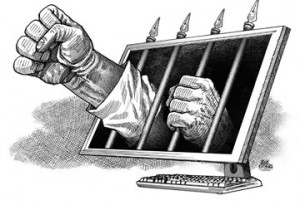Hacking is not freedom of speech

Although there are many things that a computer hacker like those advocating open source software can do, the hacking of government websites falls squarely in the category of accessing a computer system by circumventing its security settings.
The hacker who identifies himself as Anonymous Philippines claims to have done the atrocious act in protest against the Cybercrime Prevention Law (RA 10175). The hacker purportedly is protesting the end of freedom of expression in the country, and thus the raid of government websites, among them the website of the Bangko Sentral ng Pilipinas.
It is absurd that some who are opposed to this obvious draconian law have clapped their hands and praised the atrocious act of violating supposedly secure computer systems.
The cybercrime law defines cybercrime as offenses against the confidentiality, integrity and availability of computer data and systems; computer-related fraud, forgeries and identity-theft; and content-related offenses like cybersex, child pornography, unsolicited commercial communications and libel.
RA 10175 is not the first of its kind in the world. What makes it controversial is the inclusion of online libel in the acts constituting cybercrime. Worse, it sets the punishment of online libel one degree higher. Which means one can be sent to jail for 12 years for this new offense. Libel has been used effectively as prior restraint or threat of subsequent punishment, which is prohibited by the Bill of Rights.
Article continues after this advertisementJust as abhorent is the “take down clause” which empowers the Department of Justice to remove the contents that offend or even shut down a website if it finds probable cause that the contents violate the cybercrime law. This is tantamount to censorship, another prohibited act under the Bill of Rights.
Article continues after this advertisementThere are legal remedies to correct this law.
Even as we protest, there are already questions about its constitutionality pending in the Supreme Court.
We must protest against this draconian law.
But let’s put things in perspective and distinguish the rightful act of protecting democratic freedoms.
By using freedom of expression as a battlecry, whoever is behind the vandalism of government websites is piggybacking on a valid protest for some self-serving purpose.
This should not be condoned. Such acts water down valid opposition to the law.
One cannot deface the house of another and claim this is an exercise of freedom of expression.